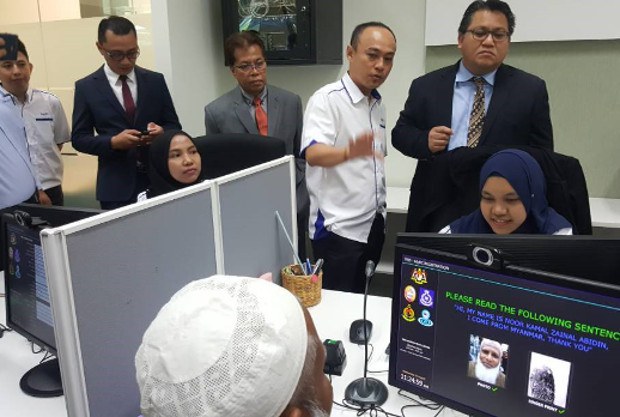UN Agrees to Help Malaysia Vet Refugees
2017.08.02
Kuala Lumpur
 Malaysia’s Deputy Home Minister Nur Jazlan Mohamed (standing, right) visits a government processing center for refugees in Kuala Lumpur, Aug. 2, 2017.
Malaysia’s Deputy Home Minister Nur Jazlan Mohamed (standing, right) visits a government processing center for refugees in Kuala Lumpur, Aug. 2, 2017.
A U.N. agency said Wednesday it would cooperate with Malaysia over concerns that Islamic State (IS) militants might be mixing in with foreigners and asylum seekers who claim refugee status in the country.
But the Kuala Lumpur office of the United Nations High Commissioner for Refugees (UNHCR) stopped short of saying whether it had agreed to share its database of some 150,000 refugees who are registered in the country and carry U.N. refugee cards.
“We are fully committed in our cooperation with the government to find ways that better protect refugees, which, at the same time, address any legitimate concerns about security, law and order,” the agency said in a statement.
It said it would work closely with the Ministry of Home Affairs by offering advice and assistance to a contracted company tasked with implementing a program to vet thousands of refugees who hold cards issued by UNHCR.
The local office of UNHCR issued the statement two days after Malaysian Deputy Home Minister Nur Jazlan Mohamed expressed concern that IS militants and sympathizers may have obtained the refugee cards that allow them to move freely about the country.
Nur Jazlan told Channel NewsAsia that the ministry had not received “appropriate cooperation from UNHCR” since the government in early April began implementing the Proof of Concept (POC) program, which is designed to help Malaysian authorities track down and stop transnational criminals, human traffickers and terrorists.
“So we want to know whether any IS links have penetrated, their numbers,” Nur Jazlan said. “And since the Malaysian public now is very concerned about the presence and high numbers of foreigners, it’s time the government identifies and closes all loopholes where they can enter. And the UNHCR route is one of them.”
As of June 2017, Malaysia was home to 149,200 refugees and asylum seekers registered with UNHCR, according to figures obtained from the agency’s website. About 90 percent were from Myanmar, including 59,100 Rohingya Muslims, Chins and other ethnic groups.
Around 67 percent were men and 37,000 of the refugees were children younger than 18, the agency said. About 16,700 refugees and asylum-seekers came from other countries such as Pakistan, Sri Lanka, Yemen, Somalia, Iraq and Afghanistan, it said.
The POC program aims to assess the actual number of UNHCR-registered refugees in the country, by providing biometric data, thumbprints and iris recognition that would be accessible to law-enforcement agencies, including the immigration department, officials said.
“These people apply for refugee and asylum status and are given a card and then they live here in the country,” Nur Jazlan told reporters after visiting the program’s offices in Kuala Lumpur on Wednesday.
“This route is very dangerous for the country due to current developments of terrorist activities in the Middle East and now moving to the southern Philippines,” he said. “They could use Malaysia to come in.”
Nur Jazlan was referring to fighting in Marawi, where government forces have been trying to dislodge IS-backed extremists who seized the southern Philippine city on May 23. They have since engaged security forces in vicious gun battles that, according to official figures, have killed at least 491 militants, 114 soldiers and 45 civilians.
‘Baseless’ statements
The comments by Nur Jazlan angered rights activists and humanitarian-aid workers.
Sharifah Shakirah, founder and director of the Rohingya Women Development Network, said the deputy home minister should be careful when making statements linking refugees with IS.
“Why do they need a UNHCR [Refugee Card] at first when they could obtain passports to enter Malaysia and freely travel around the world?” Sharifah, a Rohingya refugee, told BenarNews.
Lawyer Nurainie Haziqah, secretary-general of a local humanitarian aid group, said Nur Jazlan’s statements about potential IS links to refugees were baseless.
“Instead of working together with UNHCR, instead of working for policies and laws to help the refugees in Malaysia, they choose to make such accusations,” she told BenarNews.
Malaysia, which shares a land and maritime border with Thailand and sea borders with Singapore, Vietnam and Indonesia, has about 32 million residents, including almost 1.8 million legally registered foreign workers and about 2 million undocumented immigrants.
Since July 1, more than 5,500 foreigners have been entangled in a massive crackdown on illegal immigration.
In their separate crackdown against suspected IS members and sympathizers, Malaysian authorities have arrested 310 people since 2013. About 66 of those suspects have since been freed, according to government figures compiled by BenarNews.
Hadi Azmi contributed to the report.







